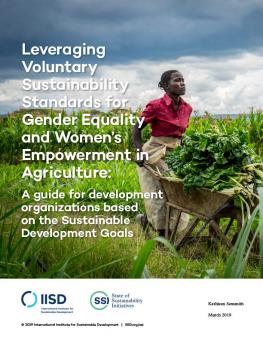
Leveraging Voluntary Sustainability Standards for Gender Equality and Women's Empowerment in Agriculture: A Guide for Development Organizations Based on the Sustainable Development Goals
Our report, available in English and French, explains how voluntary sustainability standards (VSSs) can be used as a tool to meet the SDGs and targets related to gender equality and women’s empowerment in agriculture.
Key Messages
- Voluntary sustainability standards (VSSs) can contribute indirectly to household food security and gender equality in food access through sustainable production practices that contribute to a diverse and nutritional diet, and by potentially contributing to higher incomes generated from certification.
- Financial supports provided through certification, such as pre-financing or premiums, can contribute to women’s ability to access productive inputs and credit, when producer organizations support these measures enhancing women’s rights to productive agricultures resources.
- Certification through VSSs can alleviate some of women’s domestic labour burdens through financial support for labour-saving investments, equipment and technologies.
Systemic gender inequalities and the disempowerment of women persist in agricultural production across the Global South.
For instance, rural households face significant food security concerns, and women and girls face unequal access to the calories that are available. Implementing VSSs can provide opportunities to enhance women’s economic empowerment, improve food security and achieve the United Nations Sustainable Development Goals (SDGs).
VSSs have the potential to make significant contributions to sustainable development due to their influence on certification criteria and implementing procedures with farmers and agricultural communities.
Our report, available in English and French, explains how VSSs can be used as a tool to meet the SDGs and targets related to gender equality and women’s empowerment in agriculture. It also provides recommendations for development organizations working toward that goal. Specifically, the report analyzes how VSSs:
- Can be leveraged to make positive contributions to gender equality
- Can promote gender equality depending on certain conditions
- Can exacerbate gender inequalities if not undertaken with sensitivity to local gender dynamics.
You might also be interested in
CSDDD: EU's Due Diligence Law Vote Should Drive Supply Chain Sustainability Efforts
The European Parliament has voted to adopt the Corporate Sustainability Due Diligence Directive, aiming to address the environmental and social impacts of the supply chains of Europe's large corporations.
Global Market Report: Soybean prices and sustainability
Less than 3% of soybeans are produced in compliance with sustainability standards. This report unpacks what needs to change to make soybeans a food that protects rather than harms the natural environment.
Urgent Action Is Needed to Better Reward Tea Farmers for Using Sustainable Practices
There are 13 million people propping up the global tea industry. Two thirds of those people are smallholder farmers in developing countries, many of whom live in poverty. New research from the International Institute for Sustainable Development unearths the latest consumption and production trends in the sector and explores why so many tea farmers are struggling to make a living.
Global Market Report: Tea prices and sustainability
This report explores recent market trends in the tea sector and explains why we need to get better at recognizing the social and environmental costs of tea production.